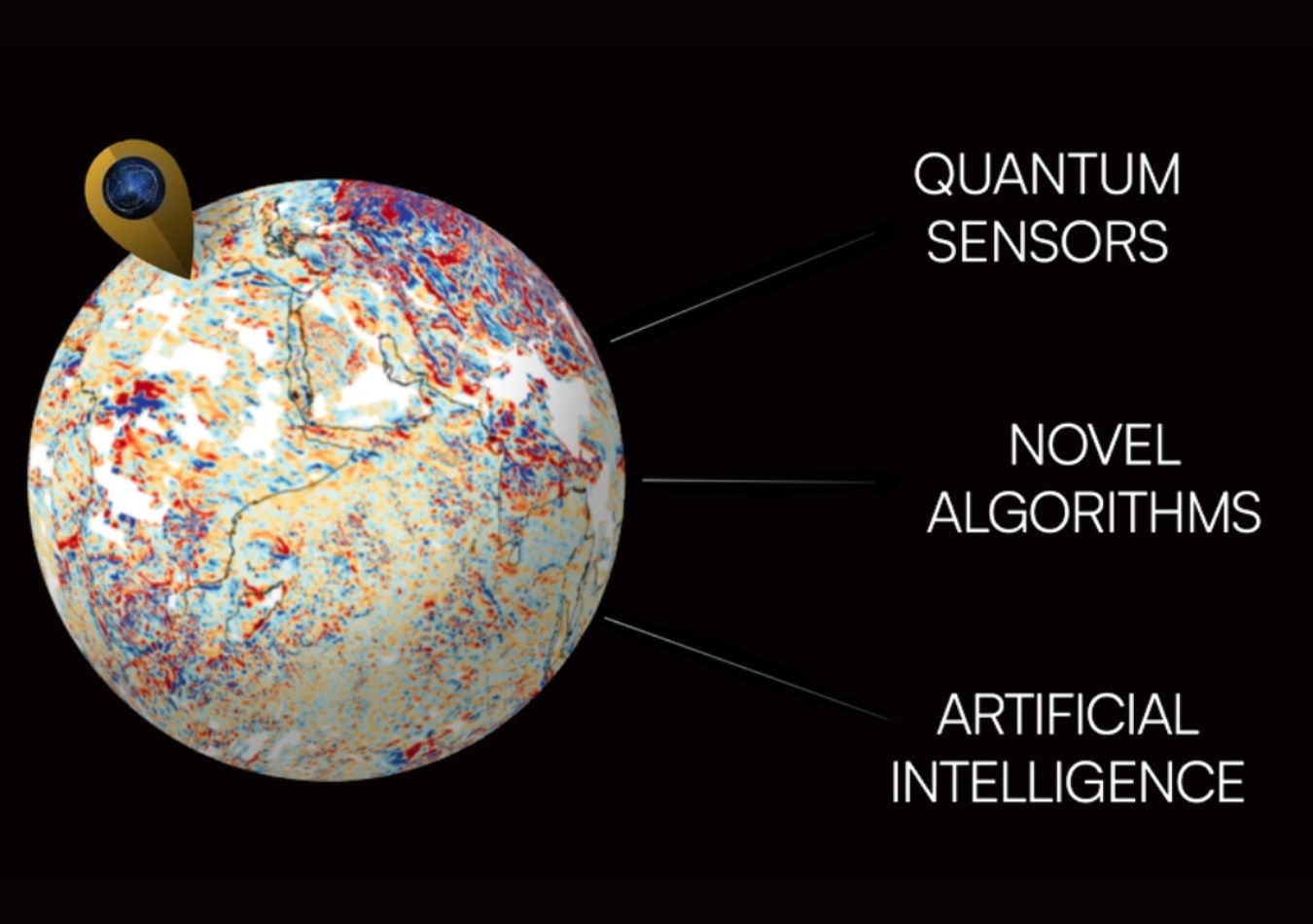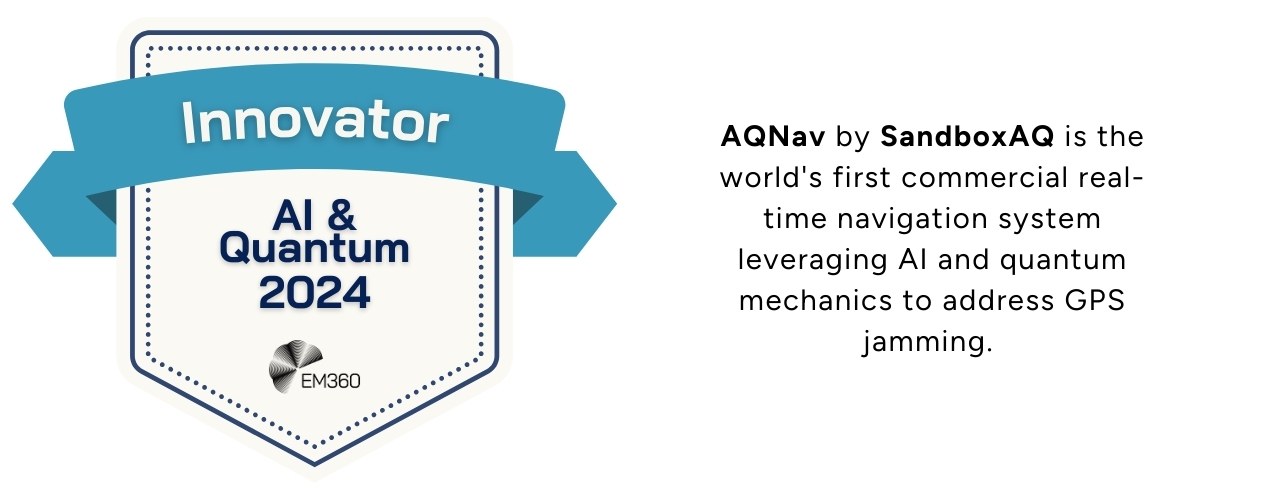
As quantum technology continues to advance, more and more companies are wielding its power for new developments.
For instance, Ford in 2019 announced the use of "quantum-inspired" technology in a traffic-routing algorithm that helped cut Seattle’s traffic by 73% and shortened commute times by 8% in a 5,000-car simulation.
Similarly, navigation systems too have increasingly relied on artificial intelligence (AI), and overcoming challenges such as reliability in tough weather conditions has remained elusive.
This is why companies have begun relentlessly exploring creative ways to enhance navigation systems using quantum mechanics.
One such company, SandboxAQ, recently launched AQNav, its latest navigation system powered by AI and quantum mechanics.
The system is resistant to jamming and spoofing and capable of functioning reliably in all weather conditions.
This article tells you everything you need to know about AQNav by SandboxAQ including what it is, some of its key features, benefits, and use cases.
What is AQNav?
AQNav is a new navigation system technology developed by SandboxAQ that harnesses the power of both artificial intelligence and quantum computing to provide real-time, reliable positioning in environments. It’s the world's first commercial real-time navigation system leveraging AI and quantum technology to address GPS jamming particularly.
It has been designed for navigation across air, land, and sea to provide real-time, reliable positioning in environments where Global Navigation Satellite Systems (GNSS) signals are vulnerable and may fail to be effective. Instead, AQNav offers an alternative to traditional GPS-based navigation especially when faced with issues like jamming and spoofing threats.
SandboxAQ’s technology is groundbreaking as it harnesses the Earth’s distinct magnetic field for precise positioning and provides an unjammable, terrain-agnostic, all-weather navigation solution, ensuring reliability and security for operations.
It’s essentially a geomagnetic navigation system that leverages proprietary AI algorithms, powerful quantum sensors, and the Earth’s crustal magnetic field.
Having officially launched on June 25, 2024, the new system has already logged over 200 flight hours and more than 40 sorties across multiple regions of the world on four different aircraft types, ranging in size from single-engine planes to large military transport aircraft.
Not only does it help with disrupted transport or logistics but AQNav’s GPS interference solution can help several other industries including agriculture, financial services, and public infrastructure and safety systems, such as environmental monitoring, utilities and roadway management, and disaster response.
How does AQNav work?
AQNav leverages highly sensitive quantum magnetometers along with AI algorithms to get data from Earth’s crustal magnetic field. This magnetic field varies geographically, exhibiting unique patterns similar to a human fingerprint which are measured by the quantum magnetometers yielding accurate magnetic signature for the device’s location.

The AI algorithms compare this data against already established magnetic maps, allowing the system to precisely determine its position.
Due to the high sensitivity of quantum sensors, AI algorithms are applied to improve the signal-to-noise ratio, removing any mechanical, electrical, or other interference that would impact the system’s ability to acquire its location.
This approach offers a significant advantage over traditional GPS-based navigation, as it is not susceptible to jamming or spoofing. AQNav can also be used in conjunction with other navigation systems, such as inertial navigation systems, to provide even greater accuracy and reliability.
Applicable across all domains – air, land, and sea, the new navigation solution is not impacted by changing weather conditions as it doesn’t depend on visual ground conditions or satellite transmissions. Instead, the system functions at room temperature which requires no shielding, and has a small form factor, easily integrated into various types of platforms. These platforms could be multi-engine airliners to unmanned aerial vehicles. Its passive technology emits no electronic signals, which reduces the aircraft's detectability.
Key features
1. Unjammable Worldwide Signal (UWS)
AQNav by SandboxAQ features an unspoofable or unjammable worldwide signal (UWS) which was developed by leveraging a combination of quantum sensors and advanced AI algorithms so communication systems are not easily jammed or interfered with.

This feature provides a secure and resilient ground-based infrastructure to boost the global communications network in any weather conditions. It harnesses the Earth's unique magnetic field and other environmental signals, enabling UWS to establish secure communication channels that are virtually impervious to jamming or spoofing.
This technology offers a vital solution for industries such as defense, aviation, and critical infrastructure, where uninterrupted and secure communication is paramount.
2. Quantum-based positioning
AQNav optimizes quantum mechanics to achieve remarkable accuracy and reliability, making it a core feature of SandboxAQ’s new navigation system. Quantum magnetometers are the driving force of this system comprising highly sensitive devices that measure the Earth's magnetic field with precision.
Unlike traditional magnetometers, quantum magnetometers exploit the quantum states of atoms or electrons to detect subtle variations in the magnetic field. This quantum advantage allows AQNav to capture minute changes in the Earth's magnetic signature, which can be used to determine location with notable accuracy.
Owing to quantum mechanics, AQNav is proving itself to be a superior solution to traditional GPS-based systems, making it ideal for applications where precision and reliability are important.
3. AI navigation
AQNav is backed by AI which equips the system with the capability to intelligently analyze and interpret data collected by quantum magnetometers. It optimizes advanced AI algorithms to efficiently process the magnetic data and compare it to already-established magnetic maps and detect patterns that correspond to specific locations.
This smart analysis enables AQNav to accurately determine its position in real-time even in complex environments or when encountering magnetic anomalies. Additionally, AI algorithms can be used to continuously refine the system's navigation capabilities, improving its accuracy and adaptability over time. This AI-driven approach ensures that AQNav remains a reliable navigation solution, capable of navigating challenging environments and unfolding threats.
5. Scalable and adaptable
AQNav has been designed with a modular architecture and honed with the ability to function at room temperature. This boosts its ability to integrate with existing infrastructure and systems for a variety of platforms from single-engine planes to multi-engine airliners across different industries including aviation and defense to autonomous vehicles and critical infrastructure.
The smart navigation system can also be customized to meet specific requirements of organizations allowing them to tailor features and settings. Also, AQNav can be configured to prioritize accuracy, speed, or power consumption based on the application’s requirements. It has the capability to learn and adapt making it flexible as well as relevant and effective in changing environments.
Key benefits
1. Seamless Integration
AQNav can interface with existing navigation systems, including inertial, visual, satellite, and other emerging technologies, creating a “system of systems” approach to ensure safe and accurate navigation.
This key benefit of the navigation system can be easily integrated into existing infrastructure and systems in addition to providing a complementary and improved positioning solution. For instance, it can incorporated into communication systems, data management platforms, and other relevant technologies to devise a comprehensive and efficient navigation and information system.
This seamless integration not only simplifies the deployment and operation of AQNav but also enhances its overall functionality and value.
2. All-weather
AQNav has a major advantage over traditional navigation systems as it’s equipped with the capability to endure all weather conditions and is terrain agnostic. The system can function reliably across different environmental conditions regardless of weather or terrain making it more long-lasting and efficient in navigating.
The system can function accurately in harsh environments such as dense forests, mountainous regions, or during extreme weather events. This versatility is vital for applications where navigation needs to be dependable under challenging conditions, such as search and rescue operations, autonomous vehicles, or military missions.
AQNav is independent of external factors like GPS signals or weather conditions and provides an effective navigation solution that can be relied upon in any environment.
3. Secure
AQNav’s quantum and AI features boost the system’s security, making it a resilient tool for navigation. In contrast to traditional GPS-based navigation systems, AQNav’s design is less susceptible to cyberattacks and other security threats that usually compromise GPS signals.
The system’s reliability and security could particularly benefit industries that need paramount unspoofable navigation systems such as defense, aviation, and other critical infrastructures. AQNav's ability to provide a reliable and secure navigation solution can help mitigate the risks connected to GPS vulnerabilities, ensuring the safety and continuity of operations.
Use Cases
1. Defense
AQNav would be highly beneficial for military use as it provides a reliable all-weather terrain-agnostic solution unaffected by changing weather conditions or terrains. The navigation systems cannot be disrupted easily nor can they be jammed easily especially when compared to traditional GPS navigation systems. The system’s resistance to jamming protects critical military communications and operations from interference. This is particularly important for covert operations, where relying solely on GPS could compromise security.
The quantum and AI-powered navigation system could be an asset for military operations such as in areas where GPS signals may be disrupted or denied, allowing it to ensure the accurate positioning and navigation of military vehicles, aircraft, and personnel.
2. Commercial aviation
AQNav can boost navigation in commercial aircraft especially when they are flying over remote mountainous conditions where GPS signals are often weak, vulnerable, and unreliable because of terrain and atmospheric conditions. An aircraft in such scenarios could benefit from a superior GPS system that is less susceptible to errors or loss of position awareness, ultimately preventing safety risks.
The pilot can benefit from redundant navigation, and enhanced safety against challenging environments helping mitigate risks of accidents or incidents. Optimizing AQNav in slights can also help reduce fuel consumption and emissions as the system would provide accurate positioning data. It would also protect the aircraft from cyberattacks and other such attacks due to its resistance to jamming and spoofing.

About SandboxAQ
SandboxAQ is a B2B company delivering AI solutions that address some of the world's greatest challenges. The company’s Large Quantitative Models (LQMs) deliver critical advances in life sciences, financial services, navigation, cyber and other sectors.
The company emerged from Alphabet Inc. as an independent, growth capital-backed company in 2022, funded by leading investors including T. Rowe Price, Eric Schmidt, Breyer Capital, Guggenheim Partners, Marc Benioff, Thomas Tull, Paladin Capital Group, and others.












